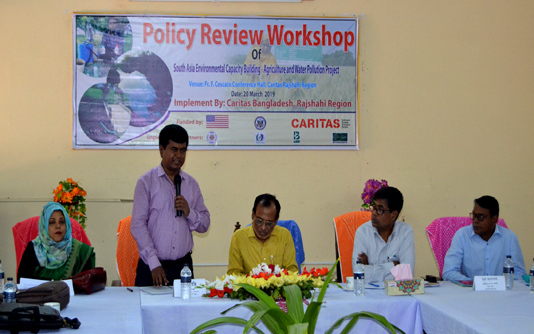RAJSHAHI, March 21, 2019 (BSS)- Integrated efforts of the government and
non-government entities concerned has become an urgent need to prevent the
land-based water pollution to protect the habitable environment from all
sorts of hazardous condition.
In the present context of exorbitant use of chemical fertilizer and
pesticides in farms, the issue of water pollution is being adjudged as a
serious threat to the public health. The problem, however, can be mitigated
to a greater extent through creating public awareness.
The observation came at a daylong policy review workshop titled “Land
Based Water Pollution” where government officials, academics, researchers,
development activists and social workers put forward a set of recommendations
on how to end the water pollution collectively.
Caritas Rajshahi region hosted the workshop at its conference hall in
Rajshahi city yesterday in association with its ‘South Asia Environmental
Capacity Building – Agriculture and Water Pollution project’.
The meeting was told that excessive and indiscriminate uses of toxic
agro-chemicals generate different kinds of risks and trouble in water, soil
and air.
Additional Director of Department of Agriculture Extension SM Mustafizur
Rahman and its Deputy Director Shamsul Haque addressed the meeting as chief
and special guests respectively with Sukleash George Costa, Regional Director
of Caritas, in the chair.
Prof ANM Wahid from Department of Law in Rajshahi University (RU) was the
keynote speaker while Prof Fahmida Chowdhury, Chairman of Department of
Agronomy and Agriculture Extension in RU, and its department colleagues Prof
Prof Mijanoor Rahman and Prof Gius Uddin Ahmed discussed on the issue.
The experts viewed substantial and sustainable promotion of organic
fertilizers and pesticide is very crucial for protecting the water resources
and soil health from pollution for the sake of producing safe food.
Using chemical fertilizers and pesticides in farming fields is always
harmful to soil, water, crops, environment and public health as a whole. So,
there is no way but to giving utmost importance towards promoting best
practices in agriculture and fish and poultry farming widely.
Prof Wahid mentioned that the pollution can be resisted through strict
enforcement of the existing laws and regulations as land-based pollution
involves a number of interrelated pressures.
He advocated for an integrated approach combining environment,
pesticides and fertilizer authorities so that they can work together to
mitigate water pollution caused by agriculture.
Besides, establishment of technologically advanced testing institutes and
awareness raising programmes for using pesticides should be taken into
consideration, he added.
Among others, Executive Editor of Daily Sonar Desh Akbarul Hassan Millat,
Chief Executive Officer of DASCOH Foundation Akramul Haque, Divisional
Coordinator of Bangladesh Environmental Lawyers Association Tonmoy Sanyal and
social activist Jamat Khan also spoke on the occasion.



